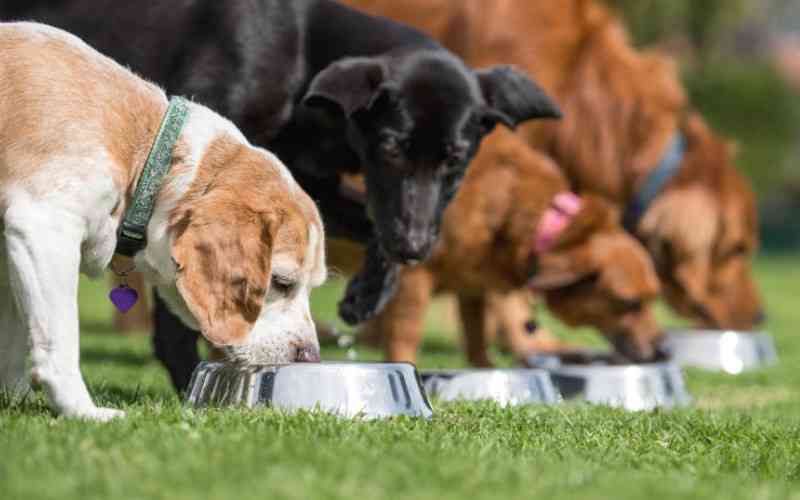- August 23, 2022
- No Comment
- 7 minutes read
When dog turns to eating grass: Is your pet turning into a cow? – FarmKenya Initiative – The Standard


Dogs in a row eating [iStockphoto]
Dogs in a row eating [iStockphoto]
Have you ever spotted your dog eating grass? It may leave you concerned. I mean your beloved canine companion clearly isn’t a cow, neither is it a goat, so you might be confused or even worried when you see it eating grass.
If your dog eats grass, is it because it is sick, or it needs to vomit, or could there be some other strange reason making it to frantically munch on the lawn?
You may also be wondering whether the animal is hungry, bored, ill or if it’s a normal behaviour. And will eating grass hurt them?
- How Ruto team intends to fix misery of farmers
- Step-by-step guide of growing spring onions in Kenya
Premium
- Using technology to save irrigation water
- Soil mapping tool to help farmers boost yield
First, rest assured that you’re not alone in your concern, especially if your dog is eating grass and vomiting. Pica is the technical term for the disorder characterised by eating things that aren’t food. Sometimes, pica indicates that your dog has some type of nutritional deficiency, though it is often simply a sign of boredom, especially when practiced by puppies and younger dogs. Actually, it is quite common for dogs to eat grass. It has been observed in many wild dogs, and may be completely natural. This form of pica does not usually cause too many problems.
Why is my dog eating grass?
Some people propose that dogs might turn to eating grass when they don’t feel well as a way to make themselves vomit, and then feel better. Others dispute this idea, on the basis that dogs are not proven to be smart enough to decide to treat an upset stomach by eating grass.
Other researchers have suggested that some dogs may regularly eat grass to help flush out any parasites that may be in their intestines. The undigested grass could help to clean out the gut by wrapping itself around any parasites and removing them as the grass passes out of the digestive tract. Evidence suggests that most dogs that eat grass aren’t unwell beforehand, or at least they don’t seem so. In fact, fewer than 10 per cent of dogs seem to be sick before eating grass, according to their owners. And grass eating doesn’t usually lead to throwing up as less than 25 per cent of dogs that eat grass vomit regularly after grazing.
Some other suggested reasons why your dog might be eating grass include improving digestion, or fulfilling some unmet nutritional need, including the need for fibre. One published study reports on a dog that ate grass and then vomited every day for three weeks. Three days after putting the dog on a high-fibre diet, the owner reported that the dog stopped eating grass entirely. And, of course, there is also the possibility that your dog simply likes the way grass tastes or feels.
How can I stop my dog from eating grass?
When you suspect your dog is eating grass because they are bored, it might be beneficial to be sure they are getting enough exercise. Engage them in some fun activities. Try playing an interactive game with them, or buy them a sturdy chew toy to keep them occupied.
On the chance that your dog’s pica behaviour is caused by a nutritional deficiency, switching to a better dog food, especially a high-fibre variety, could help alleviate the problem. On the flip side, a number of common house and garden plants are toxic, which could lead to problems if your dog munches on them along with the lawn. Moreover, dogs should never be allowed to eat grass that has been treated with fertilisers, herbicides or pesticides. There’s also a risk that slugs or snails that have travelled over the grass could infect your dog with lungworm.
When should I contact my vet?
Reach out to your vet if your dog: shows other signs, such as not eating the food you give them, looks tired or has diarrhoea or constipation, eats grass obsessively, keeps eating grass and being sick.
[Paul Kangethe is a Veterinary Surgeon and Resident Vet at FarmKenya, [email protected]]
Join Us
To personalise content, tailor ads and provide best user experience, we use cookies. By using our site, you agree to use our cookies. Privacy Policy
Subscribe to our newsletter and stay updated on the latest developments and special offers!

